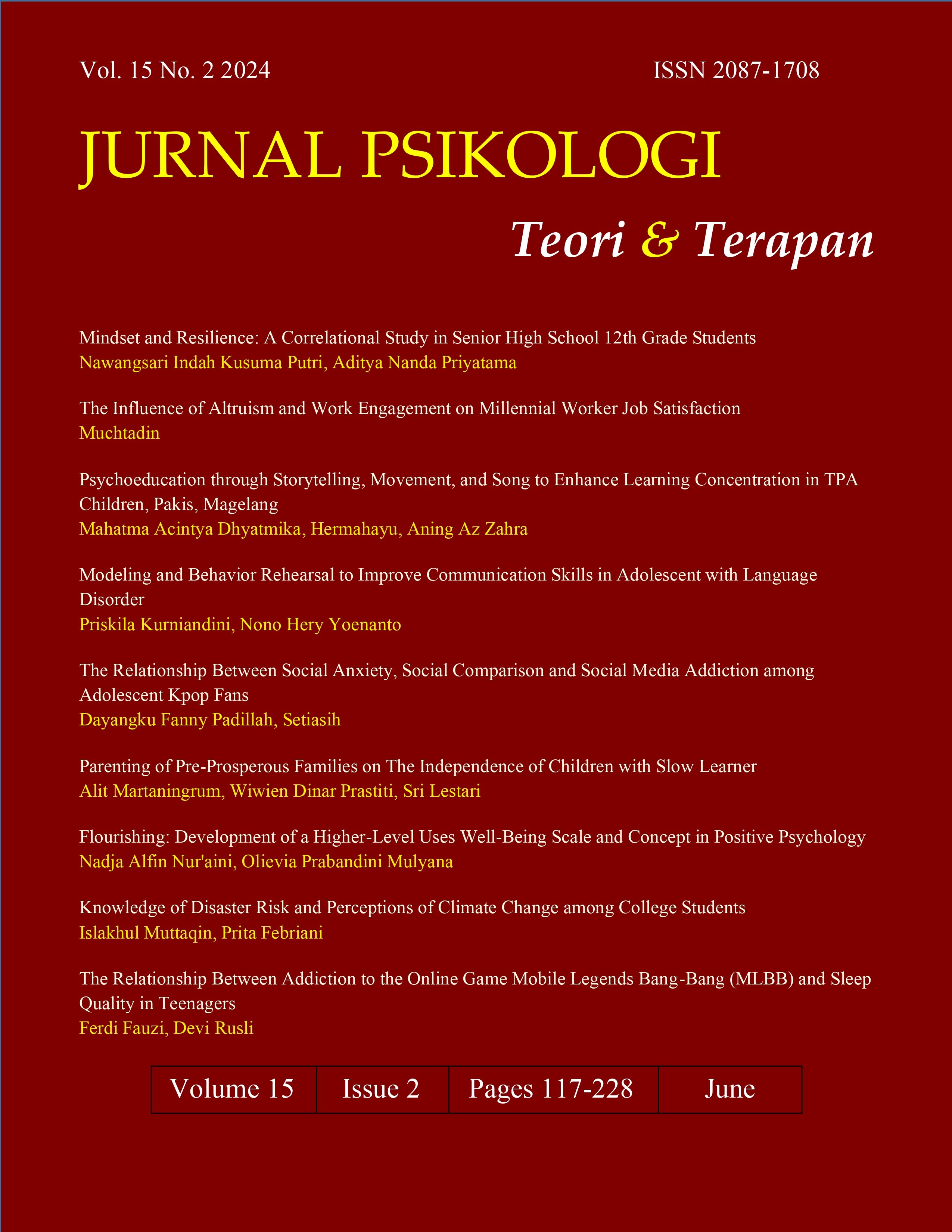The Influence of Altruism and Work Engagement on Millennial Worker Job Satisfaction
DOI:
https://doi.org/10.26740/jptt.v15n02.p126-135Keywords:
Altruism, job satisfaction, millennial generation, work engagement, altruisme, kepuasan kerja, keterlibatan kerja, generasi milenialAbstract
Background: The millennial generation has the characteristic that they do not feel tied to their work. The lack of work engagement of the millennial generation can cause them to be less satisfied with their jobs. Meanwhile, employee job satisfaction is important for every company because it can have an impact on individual and organizational performance. Objective: This research aims to determine the influence of altruism and work engagement on job satisfaction of the millennial generation. Method: Respondents were 100 millennial workers born between 1981 and 1996. The research instrument is an online questionnaire using a Likert scale with five answer choices. Partial Least Square Structural Equation Modeling was chosen as the data analysis method. Results: Altruism and work engagement each have a significant positive effect on job satisfaction. Conclusion: This research contributes to efforts to increase job satisfaction of the millennial generation through factors such as altruism and work engagement. Further research can be limited to certain industries or sectors to see the consistency of research results.
Abstrak
Latar Belakang: Generasi milenial memiliki karakteristik yaitu tidak merasa terikat dengan pekerjaanya. Kurangnya keterikatan kerja dari generasi milenial dapat menyebabkan mereka kurang puas dengan pekerjaanya. Sementara itu kepuasan kerja karyawan penting untuk dimiliki setiap perusahaan karena dapat berdampak terhadap kinerja individu maupun organisasi. Tujuan: Penelitian ini bertujuan guna mengetahui pengaruh altruism dan work engagement terhadap kepuasan kerja generasi milenial. Metode: Responden ialah 100 pekerja milenial yang lahir antara tahun 1981 sampai 1996. Metode pengambilan sampel dipilih secara convenience sampling dan termasuk ke dalam kategori non probability sampling. Data diperoleh melalui googleform dengan yang disebar melalui whatsapp, linkedin, dan facebook. PLS SEM dipilih sebagai metode analisis data. Hasil: Altruism dan work engagement masing-masing berpengaruh positif signifikan terhadap kepuasan kerja. Kesimpulan: Penelitian ini berkontribusi bagi upaya meningkatkan kepuasan kerja generasi milenial melalui faktor-faktor seperti altruism dan work engagement. Penelitian selanjutnya dapat dibatasi pada industri atau sektor tertentu guna melihat konsistensi hasil penelitian.
References
Charoensukmongkol, P., Moqbel, M., & Gutierrez-Wirsching, S. (2016). The role of coworker and supervisor support on job burnout and job satisfaction. Journal of Advances in Management Research, 13(1). https://doi.org/https://doi.org/10.1108/JAMR-06-2014-0037
Hair, J. F., Babin, B. J., Black, W. C., & Anderson, R. E. (2019). Multivariate data analysis. Cengage. https://books.google.co.id/books?id=0R9ZswEACAAJ
Jenkins, D. G., & Quintana-Ascencio, P. F. (2020). A solution to minimum sample size for regressions. PloS One, 15(2), e0229345. https://doi.org/https://doi.org/10.1371/journal.pone.0229345
Pradipto, Y. D., & Chairiyati, L. R. (2021). The role of authentic leadership, self-efficacy, job satisfaction and employee silence to organizational commitment among millennials. IOP Conference Series: Earth and Environmental Science, 729(1), 12092. https://doi.org/10.1088/1755-1315/729/1/012092
Purwanto, A. (2021). Partial least squares structural squation modeling (PLS-SEM) analysis for social and management research: a literature review. Journal of Industrial Engineering & Management Research. https://papers.ssrn.com/sol3/papers.cfm?abstract_id=3982764
Schaufeli, W. B., Shimazu, A., Hakanen, J., Salanova, M., & De Witte, H. (2017). An ultra-short measure for work engagement. European Journal of Psychological Assessment. https://doi.org/https://doi.org/10.1027/1015-5759/a000430
Downloads
Published
How to Cite
Issue
Section
License

This work is licensed under a Creative Commons Attribution-NonCommercial 4.0 International License.
Authors who publish in this journal agree to the following terms:
Copyright in any article is held by the author.
The author grants the journal, publication rights with the work simultaneously licensed under a Creative Commons Attribution License that allows others to share the work with an acknowledgment of the work's authorship and initial publication in this journal.
Authors may enter into separate, additional contractual arrangements for the non-exclusive distribution of the journal's published version of the work (e.g., posting it to an institutional repository or publishing it in a book), with an acknowledgment of its initial publication in this journal.
Authors are permitted and encouraged to post their work online (e.g., in an institutional repository or on their website) prior to and during the submission process, as this can lead to productive exchanges, as well as earlier and greater citation of published work.
 Abstract views: 631
,
Abstract views: 631
, PDF Downloads: 604
PDF Downloads: 604


















